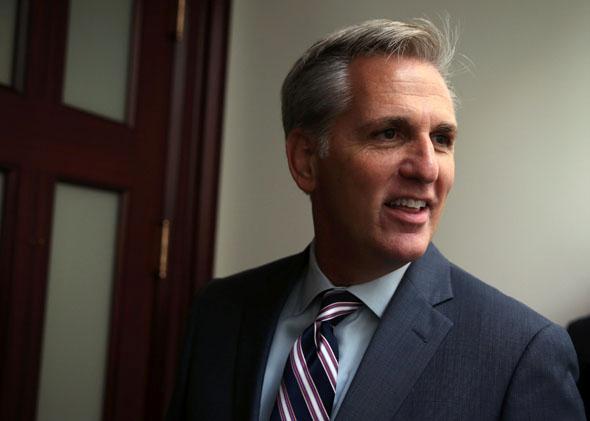Even on their own terms, House Republicans have been stunningly unproductive.
It’s not as if they’ve had a large agenda. Writing at Bloomberg View, Jonathan Bernstein counts four major promises: to repeal and replace the Affordable Care Act, to pass piecemeal immigration reform instead of a comprehensive bill, to reform the tax code with a broader base and lower rates, and to sue President Obama for ad hoc rulemaking with Obamacare and the employer mandate.
Yes, the realities of divided government mean that almost nothing the House passes would clear the Senate, much less become law. Still, there’s symbolic value in acting on priorities. Other than a few dozen repeal votes for Obamacare, however, the GOP has all but ignored acting on these goals in favor of just talking about them.
Take the Affordable Care Act. In January, Senate Republicans offered an alternative—called the Patient CARE Act—that would repeal Obamacare but preserve popular provisions like dependent coverage up to age 26 and an end to pre-existing conditions restrictions. It wouldn’t aim for near-universal coverage—a cornerstone of the ACA—but it was something. The House never got that far. Rep. Eric Cantor promised to move on a replacement during the House Republican retreat, but he lost his seat to his right-wing primary challenger, Dave Brat. After that, the plan for a replacement went by the wayside. Republicans still voiced their support for a plan—“I am ready to debate the difference between the Affordable Care Act and what’s in our bill,” said Rep. Phil Roe, co-chairman of the House GOP Doctors Caucus, in July—but there was no bill to discuss, much less hearings for ideas and proposals. At this point, it’s a political Detox—allegedly in production, and occasionally glimpsed, but never released.
The situation is just as bad with tax reform. Shortly after Cantor announced his plan to pursue conservative health reform, House Ways and Means Chairman Dave Camp released his tax reform plan, which met the stated Republican goal of lower rates, fewer brackets, and greater aid for families with children. What’s more, it ended the carried interest loophole, imposed a new fee on banks, and slashed various industry subsidies. But Republican leaders weren’t interested. When asked if the GOP would adopt Camp’s proposal as its official position on tax reform, House Speaker John Boehner scoffed. “You’re getting a little bit ahead of yourself,” he told a reporter. Wall Street threatened Republicans over Camp’s bank fee—canceling commitments for “big dollar fundraising”—dooming the proposal to a quick death. Since then, there’s been zero action on changing the tax code, although Republicans say they want to revisit the issue next year, if they win control of the Senate.
With immigration reform, it suffices to say that after a year of discussion on “piece-by-piece” reform, there’s nothing in the GOP pipeline. At most, Boehner has said he can bring his party along on reform if Obama declines executive action. “That would poison the well,” he said. “And I’ve told the president this directly: If you want to get immigration reform done, and you want to get it right, don’t do things that will poison the well.” The problem, as Dara Lind notes for Vox, is that Boehner has made this deal before:
This spring, Boehner made remarks about the need for Republicans to pass immigration reform. And so, in response, President Obama paused his ongoing review of deportation policy—in the hopes of giving Republicans one last chance to get reform together.
But nothing came of it. Even if Boehner was serious about getting his caucus together to pass reform in May, the GOP got scared by Eric Cantor’s defeat in a primary election, and then by the child-migrant crisis. In response, Obama restarted the policy review in June—and broadened the scope of possible changes, including potential fixes to the legal immigration system.
Barring a substantial change in the dynamics of immigration politics—Democrats need to deliver something to their Latino constituents; Republicans are largely unconcerned or opposed—there’s no reason to think this time is different.
As for the lawsuit? After bending to the right wing and condemning Obama as a lawless tyrant, Boehner quietly backed away. And as Kevin Drum argues for Mother Jones, it’s likely because he doesn’t have much of a case. He could still sue, but it would be even more farcical than before.
The reason to note all of this isn’t to mock Republicans as much as to put their current promises in context. To a startling degree, policy hasn’t been a concern for the House Republican majority, and several potential senators—like Republican candidates Joni Ernst in Iowa and Cory Gardner in Colorado—have shied away from policy in their campaigns. Yes, with control of Congress, Republicans might turn toward productivity. But if past behavior predicts anything, I wouldn’t count on it.
